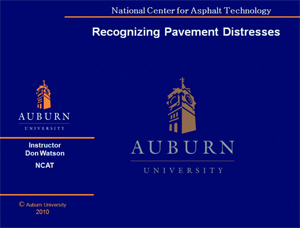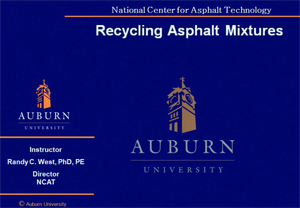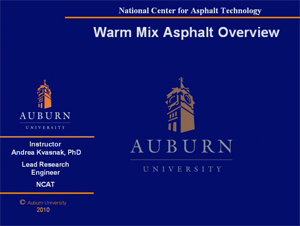- National Center for Asphalt Technology
- NCAT Videos
Free Training Courses
Recognizing Pavement Distress
Loads, stresses, and environmental factors take their toll on pavements, and the pavement begins to deteriorate. Studies have shown that capital funding can be optimized when distresses are identified early and appropriate measures are taken to extend pavement serviceability. Therefore, pavement engineers and program managers need to be able to recognize various pavement distresses and how those distresses relate to reduced performance. Planning the appropriate method of correction is also essential to make best use of the resources available.
- Upon completion of this training course, participants will be able to:
- Identify the various types of pavement distress
- Evaluate distress severity
- Determine causes of distress
- Identify alternatives for correction/rehabilitation
This course is designed for pavement engineers and others involved in managing and maintaining a pavement system for an owner/agency. The course will also prove helpful for project engineers, roadway inspectors, materials engineers and testing technicians. Since many of the observed distresses are a reflection of the quality of construction, those responsible for monitoring the quality of the mix produced and the overall construction operations will benefit. Those responsible for planning, programming, and maintenance activities will further benefit by identifying alternatives available for rehabilitation.
Recycling Asphalt Mixtures
Asphalt pavement is the most recycled product in America with approximately 73 million tons of reclaimed asphalt pavement (RAP) being recycled each year. This is nearly twice the total for recycling paper, glass, aluminum, and plastics combined. The use of RAP has both economic and environmental benefits. As the cost of crude oil and virgin aggregates increase, recycling becomes even more attractive because RAP replaces a portion of the asphalt binder and raw aggregates that would normally be required. This webinar lecture covers all aspects of RAP use from the milling operation and collection of RAP to production of the RAP mixture.
- Upon completion of this training course, participants will be able to:
- Describe the different types of asphalt pavement recycling
- Identify the economic benefits of recycling
- Identify current practices for using RAP
- List principles for RAP management
- Determine why and how to process RAP
- Describe proper sampling and testing procedures for RAP
- Describe how asphalt mixture with RAP is produced
This course is designed for contractors, agencies, and consultants who wish to learn more about potential savings while producing hot-mix asphalt (HMA) mixtures that include RAP material. The webinar will discuss principles for collecting, processing, testing, and using RAP in day-to-day production of HMA. In addition, the course will prove helpful for owner/agency personnel such as project engineers, materials engineers and testing technicians responsible for monitoring and testing the mix produced through the recycling process. Agencies and contractors may also be interested in learning what is needed to expand the use of RAP to even higher proportions than is currently used.
Warm-mix Asphalt (WMA) Overview
The hot-mix asphalt (HMA) industry has been proactive in addressing environmental concerns in regard to asphalt mix production and pavement performance. The use of WMA helps plant operators and owners meet environmental restrictions by reducing asphalt plant emissions and conserve natural resources by reducing fuel consumption. Use of WMA may also allow mixtures to be hauled greater distances or be placed in cooler weather. This webinar lecture covers all aspects of WMA, from the types of WMA technology to a comparison of both WMA and HMA.
- Upon completion of this training course, participants will be able to:
- Describe the criteria for determining what makes a WMA
- Identify the types of WMA additives and general differences in the technologies
- List some of the benefits of WMA
- Identify changes needed in the mix design process compared to HMA
This course is designed for contractor asphalt plant and roadway personnel involved in producing and placing HMA mixtures. In addition, the course will help owner/agency personnel such as project engineers, roadway inspectors, materials engineers, and testing technicians responsible for monitoring mix quality and the overall construction operations. Others associated with the HMA industry may appreciate learning how WMA technologies work, and how WMA may be adapted to their local, site-specific conditions.


